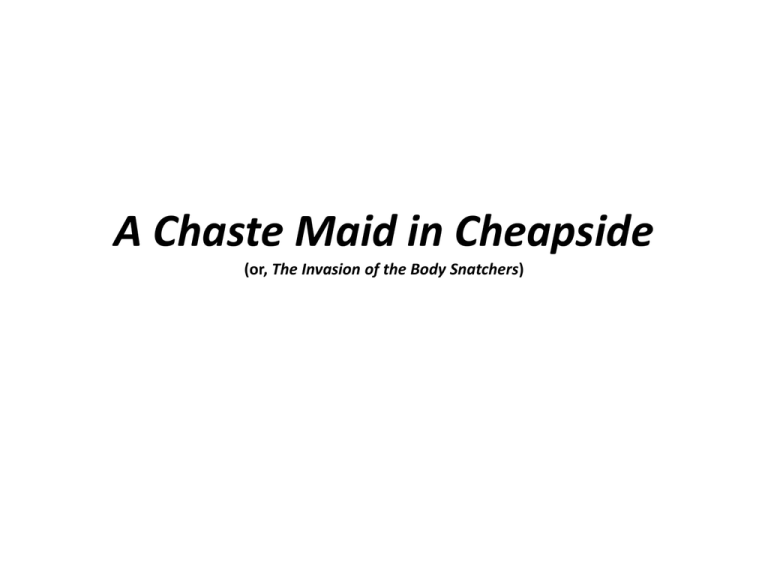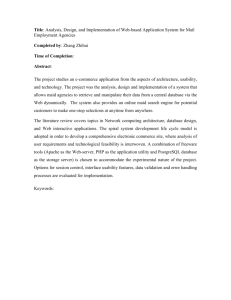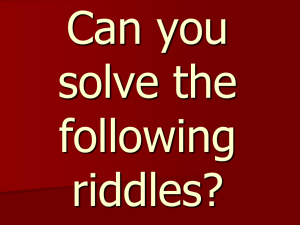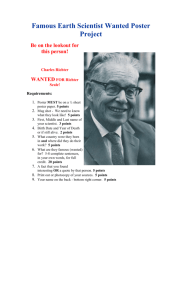A Chaste Maid in Cheapside The Invasion of the Body Snatchers
advertisement

A Chaste Maid in Cheapside (or, The Invasion of the Body Snatchers) 1. Yellowhammer is a City goldsmith; together with his wife Maudline, he is trying to marry both his children, Tim and Moll, into the landed gentry. Neither is promising: Tim, a student at Cambridge, is an overgrown schoolboy, and Moll is in love with a penniless young man about town. 2. Mrs Allwit is the kept mistress of an extravagant knight. Mr Allwit swallows his pride, pretends that the children are his own, welcomes the knight respectfully whenever he chooses to visit, and lives comfortably on the proceeds. 3. Sir Oliver Kix and his wife are wealthy and infertile, and spend their time quarrelling about it. 4. Touchwood and his wife are so fertile that they regretfully separate because they can no longer afford the consequences of their living together. So the play lays out contrasting domestic situations – having unsatisfactory children; having someone else’s children; having no children; having too many children – as if madly trying to exhaust the logical possibilities. What is more, the narrative joins them all up: strictly speaking this is a single plot. The landed gentleman whom the Yellowhammers want Moll to marry is Sir Walter Whorehound, who is also Mrs Allwit’s keeper. He is secretly in debt – hence his need for a lucrative marriage – and is creditworthy only because he is the presumptive heir to Sir Oliver Kix: in fact, the Kixes want a child mainly in order to stop him getting their estate. In a separate cross-plot link, Moll’s unacceptable lover is Touchwood Junior, the over-fertile Touchwood’s younger brother. Thus the four stories are at once separate and connected; together they produce the illusion of watching an entire society. The outcome dramatizes the connectedness. Touchwood Senior tells the Kixes he has a potion to cure barrenness; they buy it and, after a little mumbo-jumbo, he sends the husband on a journey and impregnates the wife himself. Sir Oliver supposes that Lady Kix’s pregnancy is the result of the potion, she doesn’t mind that it is not, and Touchwood is so handsomely rewarded by the grateful couple that he can be reunited with his own wife. The pregnancy leads to the bankruptcy of Sir Walter Whorehound, which leads to his expulsion from the Allwit household and the reconciliation of the husband and wife there, and also to the cancellation of his marriage to Moll Yellowhammer, who is thus able to marry Touchwood Junior. Except for Sir Walter, the entire society is brought into harmony: Touchwood Senior’s phenomenal sperm-count turns out to be the key to a general happy ending. (Peter Womack, English Renaissance Drama (Oxford: Blackwell, 2006), pp. 213-214) See also: Richard Levin, ‘The Four Plots of A Chaste Maid in Cheapside’, Review of English Studies 16 (1965), 14-24) The Plot(s) of Chaste Maid Touchwood Junior Sir Walter Whorehound Yellowhammer Allwit Daughter (Moll) to marry Sir Walter Sir Walter pays all family expenses Conclusion Conclusion Sir Walter is wounded Moll marries Touchwood Junior Sir Walter is cast out Allwits set up a nice brothel Touchwood Senior Kix Childless, so inheritance will go to Sir Walter Conclusion Sir Walter is ruined Lady Kix gets pregnant [P]roduction and exchange, equivalence and substitution, run through all four plots. (Karen Newman, ‘“Goldsmith’s ware”: Equivalence in A Chaste Maid in Cheapside’, Huntington Library Quarterly 71 (2008), 97-113; p. 106) The Title: A Chaste Maid in Cheapside • Oxymoronic (there is no such thing) • Dramatic (chaste maid in peril in Cheapside) • Appealing (chaste maid = desirable commodity) • ‘Chaste’ = chaste / chased (pursued) / chased (engraved, decorated) • ‘Maid’ = maid / made / made for life • ‘Cheap’ = bargain / cheap • ‘side’ = side of meat • Alliteration: Chaste / Cheap • Half-rhyme: Maid / side Reasons not to be cheerful: 1. This play doesn’t care about Moll Yellowhammer. 2. This play makes us complicit in the corruption of Cheapside. 3. This play does not have a happy ending. For all its scorching satire, the play’s values are hard to pinpoint. No character ‘sets a moral standard’ (David Richman). Not even Moll: she bears a criminal name, is not put off by her lover’s filthy talk, keeps trying to elope; and one can hardly serve as the play’s moral centre who speaks so few lines – a total of forty-seven in the play… Only four of Moll’s speeches are more than one line long. (Linda Woodbridge, ‘Introduction to A Chaste Maid in Cheapside’, in Thomas Middleton: The Collected Works, ed. Gary Taylor and John Lavagnino (Oxford: Clarendon Press, 2007), pp. 907-911; 909-910) MOLL I am silent with delight. (5.4.49) [T]he wittol [is] simply the most contemptible kind of cuckold. The wittol who merits such contempt is one who tolerates his wife’s promiscuity because he is powerless to stop it – the man who indeed proves himself to be the emasculated, dominated husband that the cuckold is assumed to be. (Jennifer Panek, ‘“A Wittall Cannot Be a Cookold”’: Reading the Contented Cuckold in Early Modern English Drama and Culture’, Journal for Early Modern Cultural Studies 1 (2001), 66-92; p. 72) ALLWIT I thank him, he’s maintained my house this ten years, Not only keeps my wife, but a keeps me And all my family. I am at his table; He gets me all my children, and pays the nurse Monthly or weekly; puts me to nothing... The happiest state that ever man was born to! I walk out in a morning; come to breakfast, Find excellent cheer; a good fire in winter; Look in my coal-house about midsummer eve, That’s full, five or six chaldron new laid up; Look in my backyard, I shall find a steeple Made up with Kentish faggots, which o’erlooks The water-house and the windmills: I say nothing, But smile and pin the door... (1.2.16-30) As his name suggests, Allwit's role in the mercantile economy of Cheapside is to submit questions of emotional investment to a cost–benefit analysis — producing the satirical picture of a household organized entirely around the housekeeper's unconventional notion of self-interest and his desire to escape the dark emotions produced by possessiveness in the form of love. Thus the expenditure of self in jealousy is a form of unproductive labour that Allwit has also passed along to the knight. (Gail Kern Paster, ‘The Ecology Of The Passions In A Chaste Maid In Cheapside and The Changeling’, in The Oxford Handbook of Thomas Middleton, ed. Gary Taylor and Trish Thomas Henley (Oxford: OUP, 2012), p. 154) ALLWIT These torments stand I freed of; I am as clear From jealousy of a wife as from the charge. O, two miraculous blessings! ’Tis the knight Hath took that labour all out of my hands. I may sit still and play; he’s jealous for me. (1.2.49-53) Allwit makes his failure a strange kind of personal success as he eventually overcomes his subordination to Whorehound. The psychoanalytic distinction one should draw between Allwit and his dramatic predecessors [wittols in earlier texts] in order to account for his success is the distinction between two forms of clinical masochism: ‘on one hand the properly perverse “contractual” masochism, that is, the masochism of a subject who is able to “externalise” his fantasy, to pass to the act and realise his masochistic scenario in an actual interaction with another subject; on the other hand, the (hysterical) secret masochistic daydreaming which is unable to endure its actualisation’ ([Slavoj Žižek , The Ticklish Subject, p. 309]). With Allwit, Middleton has made the wittol pass from the debilitating form of the latter to the far less pathologically and potentially even subversive mode of the former. .. By fully assuming, rather than denying, his subordinate position as wittol, Allwit is able to break the class-determined homosocial code between himself and Whorehound, thereby subverting it for his own ends. (Gary Kuchar, ‘Rhetoric, Anxiety, and the Pleasures of Cuckoldry in the Drama of Ben Jonson and Thomas Middleton’, Journal of Narrative Theory 31 (2001), 1-30; p. 26) SIR WALTER Put on, put on, Jack. ALLWIT I thank your kind worship, sir. SIR WALTER Slippers! [Second Servant brings slippers] Heart, you are sleepy! ALLWIT [aside] The game begins already. SIR WALTER Pish! Put on, Jack. ALLWIT [aside, putting on his hat] Now I must do it, or he’ll be as angry now, as if I had put it on at first bidding. ’Tis but observing; ’tis but observing a man’s humour once, and he may ha’him by the nose all his life. (1.2.75-84) The moment that one sides, however briefly, with Allwit, and admits that he has a good deal going, one becomes complicit with a system of commercial values in which such supposed moral absolutes as female chastity and the sanctity of marriage are recognised to be merely a matter of managing the ownership of another possession, a possession which, like any other, can be conserved or traded depending on the contingencies of profitability. And while the audience’s complicity with Allwit implicates them in the play’s satire of urban materialism, this satire itself cheerfully resists any call for a return to good old moral absolutes. Rather, it merrily rewards the wittol and his wife: amid all the strife and misfortune we see in Chaste Maid’s other families, the Allwits live in striking peace and comfort. And so, by allowing the audience to delight in Allwit’s watertight combination of patriarchal privilege and escape from patriarchal responsibility, A Chaste Maid in Cheapside exposes how the supposedly natural morality of wifely chastity is more bound up with the values of the marketplace than the orthodoxies of the time were prepared to admit. (Panek, p. 86) The process of exchange: Touchwood Senior • marital and extra-marital sex = children = no money • suspends marriage to save money • uses money to dispose of child • ‘And would I were rid of all the ware i’the shop so!’ (2.1.100) Wench • ‘This is the fifth; if e’er I venture more, / Where I now go for a maid, may I ride for a whore.’ (2.105-106) • illicit sex = children • uses children to get (extort?) money • uses money to buy meat • uses meat to dispose of child Promoters • enforce rules of Lent = money • confiscate illicit products = meat • take bribes = more money • swear to keep basket = mutton and (unexpectedly) a child SECOND PROMOTER Some loin of veal? FIRST PROMOTER No, faith, here’s a lamb’s head, I feel that plainly. (2.2.164-166) FIRST PROMOTER Half our gettings must run in sugar-sops And nurses’ wages now, besides many a pound of soap And tallow; we had need to get loins of mutton still, To save suet to change for candles. (2.2.174-177) SECOND PROMOTER Let’s e’en go to the Checker at Queenhithe, And roast the loin of mutton till young flood; Then send the child to Brentford. (2.2.186-188) TIM By logic I’ll prove anything. MAUDLINE What, thou wilt not! TIM I’ll prove a whore to be an honest woman. MAUDLINE Nay, by my faith, she must prove that herself, Or logic will never do’t. TIM ’Twill do’t, I tell you. MAUDLINE Some in this street would give a thousand pounds That you could prove their wives so. TIM Faith, I can, And all their daughters too, though they had three bastards. (4.1.40-48) TIM I grant you I may prove another man’s wife so, But not mine own. MAUDLINE There’s no remedy now, Tim; You must prove her so as well as you may. (5.4.104-106) WELSH GENTLEWOMAN Sir, if your logic cannot prove me honest, There’s a thing called marriage, and that makes me honest. MAUDLINE O, there’s a trick beyond your logic, Tim. (5.4.110-112) TOUCHWOOD SENIOR I cannot think there’s anyone amongst you In this full fair assembly, maid, man, or wife, Whose heart would not have sprung with joy and gladness To have seen their marriage day. ALL It would have made a thousand joyful hearts. TOUCHWOOD SENIOR [to Touchwood Junior and Moll] Up, then, apace and take your fortunes, Make these joyful hearts; here’s none but friends. [Moll and Touchwood Junior rise out of their coffins] (5.4.23-29) Your new bodies are growing in there. They're taking you over cell for cell, atom for atom. There is no pain. Suddenly, while you're asleep, they'll absorb your minds, your memories and you're reborn into an untroubled world. Where everyone's the same? Exactly. What a world. We're not the last humans left. They'll destroy you! Tomorrow you won't want them to. Tomorrow you'll be one of us. I love Becky. Will I still feel the same tomorrow? There's no need for love. No emotion? Then you have no feelings, only the instinct to survive. You can't love or be loved! Am I right? You say it as if it were terrible. Believe me, it isn't. You've been in love before. It didn't last. It never does. Love. Desire. Ambition. Faith. Without them, life is so simple, believe me. I don't want any part of it. You're forgetting something, Miles. What's that? You have no choice. (Invasion of the Body Snatchers, sc. Daniel Mainwaring (from the novel by Jack Finney), 1956) YELLOWHAMMER The best is, One feast will serve them both! Marry, for room, I’ll have the dinner kept in Goldsmiths’ Hall, To which, kind gallants, I invite you all. (5.4.119-122) In Chaste Maid it is the community of mourners whose assent seals the comic covenant transporting the scene abruptly from rite of remembrance to festive rite of union. (Andrew Gordon, Writing Early Modern London (New York: Palgrave Macmillan, 2013), p. 172) Far from representing Tim’s marriage to the whore as different from and devalued in comparison to the marriage of Touchwood Junior and Moll, the play contradicts such moralising judgments… The final lines are spoken by Yellowhammer, who asserts sententiously that fortune seldom ‘deals two marriages / with one hand, and both lucky’ – lines that even in their suggestion of difference equate the two marriages linguistically. (Newman, p. 110)




